七年级英语上册《Module 8 Choosing presents Unit2 She often goes to concerts》教案 外研版
外研版七年级上册Module 8 Choosing presents Unit 1

eggs × ×
●When it is my birthday,
1. I always get a cake from my mother. 2.I usually get presents from my friends. 3.I often have a party at home 4.My friends never make a cake for me.
would like意为“想,想要”,与want 意义相同,但语气更委婉。would like可与 任何人称连用,没有人称和数的变化,肯 定句中would常在主语后面缩写为’d。
肯定句:主语 + would like … 一般疑问句:Would + 主语 + like …? 特殊疑问句:疑问词 + would + 主语 + like …?
√
√
Sunday
√
×
Adverb of frequence always usually
Sam
√ √ √ × √ √ ×
often
Betty
× × × × × × ×
never
fill the table with always, usually, often or never.
Jim
1.Jim _a_l_w__a_y_sgoes day
cake
balloons
hats
[bə'lu:n]
flowers
present s
candy candles
card
What other words do you know about
birthday? beer dance sing friends
外研版七年级英语上册《Module 8,Choosing presents Unit 1》教学设计

外研版七年级英语上册《Module 8,Choosing presents Unit 1》教学设计一. 教材分析《Module 8, Choosing presents Unit 1》是人教版初中英语七年级上册的一篇课文。
本课主要讲述在选择礼物时,要考虑对方的喜好和需要。
教材内容贴近学生的生活实际,有利于激发学生的学习兴趣。
通过本课的学习,学生能够掌握相关词汇和句型,运用所学知识进行日常交流。
二. 学情分析七年级的学生具备一定的英语基础,对日常生活话题感兴趣。
但部分学生可能在词汇量和语法知识方面有所欠缺,需要教师在教学中给予关注和引导。
三. 教学目标1.知识目标:学生能够掌握本课中的词汇和句型,正确运用它们进行交流。
2.能力目标:学生能够听懂、说清、读懂有关选择礼物的对话,提高口语表达能力和阅读理解能力。
3.情感目标:学生能够学会在选择礼物时考虑对方的喜好和需要,培养关爱他人的意识。
四. 教学重难点1.重点:词汇和句型的学习,以及运用它们进行日常交流。
2.难点:正确运用情态动词和一般现在时进行表达。
五. 教学方法1.情境教学法:通过设定情境,让学生在实际语境中学习词汇和句型。
2.任务型教学法:通过完成任务,激发学生的学习兴趣,提高口语表达能力。
3.小组合作学习:培养学生团队合作精神,提高课堂参与度。
六. 教学准备1.教材、录音机、投影仪等教学设备。
2.与本课内容相关的图片、卡片等教学辅助材料。
3.事先学生进行小组合作学习,准备相关任务。
七. 教学过程1.导入(5分钟)利用图片或实物引入主题,激发学生的兴趣。
例如,展示一些礼物图片,让学生猜测对方喜欢什么样的礼物。
2.呈现(10分钟)教师播放课文录音,让学生跟读。
然后展示课文内容,引导学生关注关键词和句型。
3.操练(10分钟)学生分角色朗读课文,模仿语音语调。
教师选取几个学生进行角色扮演,其他学生观看并给予评价。
4.巩固(10分钟)学生进行小组合作学习,完成相关任务。
七年级英语(上册)(外研版)Module8Choosingpresents知识点总结
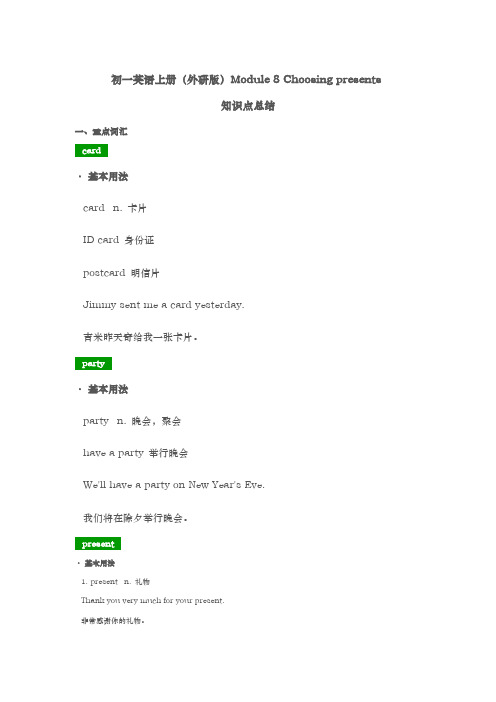
初一英语上册(外研版)Module 8 Choosing presents知识点总结一、重点词汇·基本用法card n. 卡片ID card 身份证postcard 明信片Jimmy sent me a card yesterday.吉米昨天寄给我一张卡片。
·基本用法party n. 晚会,聚会have a party 举行晚会We'll have a party on New Year's Eve.我们将在除夕举行晚会。
·基本用法1. present n. 礼物Thank you very much for your present.非常感谢你的礼物。
2. present adj. 出席的,在场的All the people present at the meeting agree to the plan.所有到会的人都同意这个计划。
·原文再现I always like birthday parties.我总是喜欢生日聚会。
·基本用法always adv. 总是,一直,通常位于行为动词之前,be动词或情态动词之后。
I always get everything ready before going out.我总是在出去之前把一切准备好。
She's always late for everything.她事事都迟到。
·知识拓展--相关单词用来表示频率的副词还有:usually 通常地often 经常地seldom 很少hardly 几乎不sometimes 有时never 从不·原文再现Great!太棒了!·基本用法great adj. 太好了,巨大的,很棒的What a great idea!好主意!This cake tastes great.这块蛋糕吃起来很不错。
·原文再现And we eat birthday cake too.并且我们也吃生日蛋糕。
外研版七年级英语上册《Module 8,Choosing presents Unit 3》教学设计

外研版七年级英语上册《Module 8,Choosing presents Unit 3》教学设计一. 教材分析外研版七年级英语上册《Module 8, Choosing presents Unit 3》主要讲述了在选择礼物时,如何根据对方的喜好和需求来做出决定。
本课的主要语言点是情态动词“can” 的用法,以及与礼物相关的词汇和表达方式。
通过本课的学习,学生能够熟练运用情态动词“can” 描述对方的能力和需求,并能用英语流利地讨论选择礼物的相关话题。
二. 学情分析七年级的学生已经掌握了基本的英语语法和词汇,对情态动词“can” 的用法有一定的了解。
然而,他们在实际应用中可能会遇到困难,如如何正确使用“can” 来描述对方的能力和需求。
此外,学生可能对一些与礼物相关的词汇和表达方式不太熟悉,需要通过课堂学习和实践来掌握。
三. 教学目标1.能够正确使用情态动词“can” 来描述对方的能力和需求。
2.能够熟练运用本课所学的词汇和表达方式,流利地讨论选择礼物的相关话题。
3.能够提高自己的听力、口语和表达能力,增强对英语语言的兴趣和自信心。
四. 教学重难点1.正确使用情态动词“can” 来描述对方的能力和需求。
2.掌握与礼物相关的词汇和表达方式。
3.在实际交流中运用所学知识,提高听力、口语和表达能力。
五. 教学方法1.任务型教学法:通过设定具体的情境和任务,让学生在实际操作中运用所学知识,提高语言实践能力。
2.情境教学法:通过模拟真实的购物场景,让学生在具体的情境中学习并运用本课所学的词汇和表达方式。
3.交际法:鼓励学生积极参与课堂互动,进行角色扮演和小组讨论,提高口语表达能力和交际能力。
六. 教学准备1.教学课件:制作与本课内容相关的课件,包括图片、视频和练习题等。
2.教学材料:准备与礼物相关的实物物品,如玩具、书籍等,用于展示和练习。
3.录音设备:用于播放听力材料。
七. 教学过程1.导入(5分钟)通过播放一段关于购物的视频,引导学生思考他们在购物时会考虑的因素。
外研版七年级上册 Module 8 Choosing presents Unit 1 I alway

× 3. Daming anlewvaeyrs has birthday presents.
Everyday English
● Would you like to come to my birthday party?
● It’s a secret.
I love you
mum
Different countries have different ways to celebrate birthday 不同国家不同的生日庆祝方式
What do you never do on your birthday?
What do you never do on your birthday?
I never cry on my birthday.
cry
drink
Talk: work in pairs.
100% 80% 60% 40%
I always get a present.
What do you often do on your birthday?
I often have a birthday party.
What do you often do on your birthday?
make a wish blow the candles make a cake
3. Know how to celebrate a birthday.
Words and expressions
card n. 卡片 party n. 晚会;聚会 present n. 礼物 would v.aux. 肯;会;愿意 always adv. 总是;一直 great adj. 太好了;巨大的 cake n. 蛋糕
Module8+++Choosing++presents单词过关练-外研版英语七年级上册

Module 8 Choosing presents Unit1一、必会单词1、[kɑ:d] n. 卡片2、[ pɑ:ti] n. 晚会3、[ prezənt] n. 礼物4、[wud] aux. 肯,会;5、[ ɔ:lweiz] adv. 一直6、[ɡreit] adj. 巨大的;7、[keik] n. 蛋糕8、[ nevə] adv. 从不9、[ speʃəl] adj. 特别的;10、[kʌt] vt. 切;剪11、[ɡiv] vt. 给;送12、[siŋ] vt. 唱;13、[ hæpi] adj. 幸福的;高兴的14、[ si:krit] n. 秘密二、必会短语1.生日聚会2.吃面条3.生日卡片4.用汉语5.生日礼物6.为你的生日三、必会句子:1.“你愿意来参加我的生日聚会吗?”“是的,我愿意去。
”— you to my birthday party?—Yes,I’d love to.2.在中式生日聚会上,你们通常做什么?you usually at a Chinese birthday party?3.她通常买一个特别的(蛋糕),并由我在聚会上切。
She usually buys a one and I it .4.这是个秘密。
.四、提升练习Ⅰ.用所给词的适当形式填空1.Would you like (come) to my birthday party?2.He never (watch) TV from Monday to Friday.3.She (not play) volleyball on Monday.4.I will buy some (present) for my parents.5.Linda often (get) some flowers on Teachers’ Day.6.Lingling her mother at home.(often)(help)7.Jack up late in the morning.(never)(get)8.Sandy to school at seven in the morning.(always)(go)9.My uncle football matches on TV at home.(usually)(watch) Ⅱ.根据汉语意思完成句子6.她从来不玩电脑游戏。
外研版七年级英语上册英语《Module 8,Choosing presents Unit 2》教学设

外研版七年级英语上册英语《Module 8,Choosing presents Unit 2》教学设计一. 教材分析外研版七年级英语上册《Module 8, Choosing presents Unit 2》的主要内容是关于选择礼物的对话。
通过本节课的学习,学生能够掌握如何根据场合和人物选择合适的礼物,以及如何表达自己的喜好和意见。
教材通过丰富的情景设置和真实的语言环境,培养学生的听说能力和语言运用能力。
二. 学情分析七年级的学生已经具备了一定的英语基础,能够听懂简单的日常用语,并能进行简单的交流。
但部分学生对一些特定场合的用语和表达方式还不够熟悉,需要老师在教学中进行引导和讲解。
三. 教学目标1.知识目标:学生能够掌握与选择礼物相关的词汇和表达方式,如“birthday present”,“Christmas gift”等。
2.能力目标:学生能够听懂并能够运用所学知识进行简单的交流,如询问对方喜好、表达自己的意见等。
3.情感目标:通过本节课的学习,学生能够学会如何为他人选择合适的礼物,培养学生的关爱他人的意识。
四. 教学重难点1.重点:学生能够掌握与选择礼物相关的词汇和表达方式。
2.难点:学生能够听懂并能够运用所学知识进行简单的交流,如询问对方喜好、表达自己的意见等。
五. 教学方法1.情境教学法:通过设置不同的情景,让学生在真实的语言环境中进行听力和口语练习。
2.任务型教学法:通过设计不同的任务,让学生在完成任务的过程中运用所学知识。
3.小组合作学习:通过小组讨论和交流,培养学生团队合作和共同解决问题的能力。
六. 教学准备1.教学PPT:制作教学PPT,包含本节课的主要内容、情景设置和练习题等。
2.教学素材:准备与选择礼物相关的图片、实物等教学素材。
3.录音设备:准备录音设备,用于播放听力材料。
七. 教学过程1.导入(5分钟)通过播放一段关于选择礼物的听力材料,让学生初步了解本节课的内容。
然后引导学生进行讨论,询问他们对礼物的看法和喜好。
Module8ChoosingpresentsUnit1课件七年级英语上册2
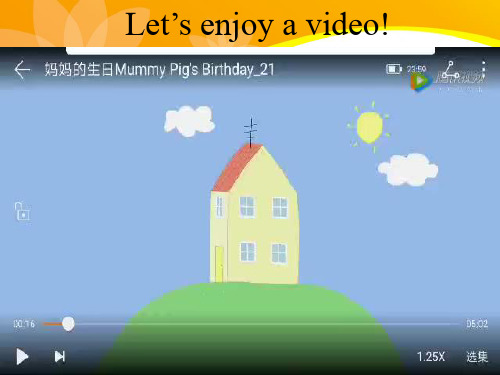
M is for the million things she gave me, O means only that she’s growing old, T is for the tears(眼泪) she shed to save me, H is for her heart of purest gold, E is for her eyes, with love-light shining, R Ymoeuarnbsirrtihgdhaty, aisnydoruirghmtostheer’l’lsasulwffaeyrisnbged.ay.
Work in pairs.
— What would you like to do at your birthday party?
— I’d like to …
eat birthday cakes sing Happy Birthday get birthday cards or presents cut the cakes eat noodles ……
Let’s read the conversation
sentence by sentence!
loudly (大声地) correctly (正确地) fluently (流利地) beautifully (优美地)
Role-play
Lingling Tony Betty Daming Pay attention(注意): pronunciation(语音) intonation(语调) feelings(情感)
2. Key structures: Would you like to …? What do you usually do at …?
3. Key phracakes cut a birthday cake give birthday cards get birthday presents…
秋七年级英语上册 Module 8 Choosing presents Unit 3 Languag

Module 8 Choosing presentsUnit 3 Language in use一、学习目标1.单词和短语:card, party, present, would, always, great, cake, never, special, eat, give, sing, happy, secret, CD,cinema, concert, magazine, scarf, silk, shirt, T-shirt, choose, exercise, wear, expensive,clothes, shoes, spend, money, film, song, match, weekend, at weekends, dear, hear, hear from,afraid2.交际用语:1)—Would you like to e to my birthday party?—Yes, I’d like to. When is it?2)Great!3)It’s a secret.3.重点句子:1) Daming always gets birthday presents!2) She often goes to the cinema.3) What do you usually do at a Chinese birthday party?4) We sometimes give birthday cards.5) My mother never makes a birthday cake.二、重点及难点:1.频度副词的使用及在句中的位置。
2.动词第三人称单数形式。
三、教学设计:Unit 3 Language in useⅠTeachi ng modelRevision and applicationⅡTeaching methodTasked-basedⅢTeaching aimsTo summarise and consolidategrammar focus.Present simple with he , she , it .Adverbs of frequency.ⅣTeaching ObjectivesKey vocabulary: dear, hear, hear from, afraidKey structures : To summarise and consolidate grammar focus . Present simple with he,she, it .Adverbs of frequency.ⅤTeaching aidsTape recorder, OHP , handoutsⅥTeaching StepsStep 1 RevisionReview the text of Unit 1 and Unit 2 .Step 2 Language practice1. Read through the example sentences in the box with the whole class.2. Ask the students to repeat the sentences in the box.3. Grammar: Adverbs of frequency.Step 3 Work in pairs1. Ask one or two students the question:— Does Grandpa always watch TV?—Yes, he does.2. Ask and answer questions about Grandpa.3. Carry on with other students until everyone understands the aim of the activity.4. plete the table in Activity 1 for yourself.5. Work in pairs.6. Ask and answer.Step 4 Rewrite the sentences with the words in brackets.1. Review the using of often, usually, always, never.2. Ask the students to do this activity on their own, then check with a partner.3. Call back the answers from the whole class, check the answers.Keys :1. I often go to the cinema.2. He usually plays football on Saturday.3. She always gets up at 7:00.4. They never eat chocolate at home.Step 5 plete the sentences with Would you like …or Let’s.1. Ask the students to read through the example sentence.2. plete the senten ces with Would you like …or Let’s.2. Call back the answers from the whole class, check the answers.Keys:1. Would you like2. Let’s3. Let’s4. Would you like5. Would you like6. Let’s Step 6 Read the emails and check (√) the true sentences.1. Ask the students to read through the emails.2. Ask the students to check (√) the true sentences3. Call back the answers from the whole class, check the answers.Keys:1. √2. ×3. ×4.√Step7 Around the world: Birthday presents1. Ask the students to look at the picture and discuss what they can see.2. Read through the information with the whole class, and talk something about them. Step 8 Module task: Planning a classmate’s birthday party.A. Work in pairs. Ask and answer questions about each other’s birthda y party.1. When is your birthday?2. Do you always have a birthday party?3. What do you usually do at your birthday party?B. Plan a birthday party for your partner.Choose the time and placeChoose the foodChoose what to doC. Work with the whole class. Describe your plans for your partner’s birthday party. Don’t say who your partner isNow guess who your partner is…Step 9 ExerciseA. 翻译下列句子:。
外研社七年级上英语英语《Module8,Choosingpresents》说课稿
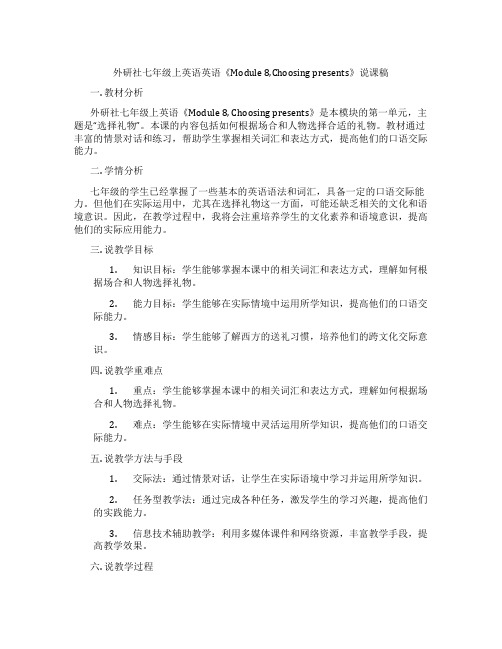
外研社七年级上英语英语《Module 8,Choosing presents》说课稿一. 教材分析外研社七年级上英语《Module 8, Choosing presents》是本模块的第一单元,主题是“选择礼物”。
本课的内容包括如何根据场合和人物选择合适的礼物。
教材通过丰富的情景对话和练习,帮助学生掌握相关词汇和表达方式,提高他们的口语交际能力。
二. 学情分析七年级的学生已经掌握了一些基本的英语语法和词汇,具备一定的口语交际能力。
但他们在实际运用中,尤其在选择礼物这一方面,可能还缺乏相关的文化和语境意识。
因此,在教学过程中,我将会注重培养学生的文化素养和语境意识,提高他们的实际应用能力。
三. 说教学目标1.知识目标:学生能够掌握本课中的相关词汇和表达方式,理解如何根据场合和人物选择礼物。
2.能力目标:学生能够在实际情境中运用所学知识,提高他们的口语交际能力。
3.情感目标:学生能够了解西方的送礼习惯,培养他们的跨文化交际意识。
四. 说教学重难点1.重点:学生能够掌握本课中的相关词汇和表达方式,理解如何根据场合和人物选择礼物。
2.难点:学生能够在实际情境中灵活运用所学知识,提高他们的口语交际能力。
五. 说教学方法与手段1.交际法:通过情景对话,让学生在实际语境中学习并运用所学知识。
2.任务型教学法:通过完成各种任务,激发学生的学习兴趣,提高他们的实践能力。
3.信息技术辅助教学:利用多媒体课件和网络资源,丰富教学手段,提高教学效果。
六. 说教学过程1.导入:通过提问学生喜欢的礼物和送礼物的经历,激发学生的学习兴趣,引入本课主题。
2.新课呈现:通过情景对话,让学生了解如何根据场合和人物选择礼物。
3.操练环节:学生分角色扮演,模仿对话,巩固所学知识。
4.任务型活动:学生分组讨论,根据不同的场合和人物,设计合适的礼物方案。
5.输出环节:学生展示自己的礼物方案,大家共同评价,提高口语交际能力。
6.总结:对本课内容进行总结,强调如何根据场合和人物选择礼物。
外研版七年级上册英语Module 8:Choosing presents单元(模块)整体教学设计

外研版七年级上册英语Module 8:Choosing presents单元(模块)整体教学设计一. 教材分析外研版七年级上册英语Module 8: Choosing presents单元主要围绕购买礼物这一主题展开。
通过本单元的学习,学生能够掌握与购物相关的词汇和表达方式,学会如何根据场合和人物选择合适的礼物。
教材通过听力、口语、阅读和写作等多种形式,让学生在实际语境中运用所学知识,提高他们的语言运用能力。
二. 学情分析七年级的学生已经掌握了基本的英语语法和词汇,具备一定的听说读写能力。
但他们在实际运用英语进行交流时,还存在着一定的困难。
因此,在教学过程中,教师需要关注学生的个体差异,充分调动他们的学习积极性,引导他们主动参与课堂活动。
三. 教学目标1.知识目标:学生能够掌握与购物相关的词汇和表达方式,了解如何根据场合和人物选择合适的礼物。
2.能力目标:学生能够在实际语境中运用所学知识,提高他们的语言运用能力。
3.情感目标:培养学生关心他人,懂得礼尚往来的良好品质。
四. 教学重难点1.重点:购物相关词汇的掌握和实际运用。
2.难点:如何根据场合和人物选择合适的礼物,以及相关表达方式的运用。
五. 教学方法1.任务型教学法:通过设定各种真实的购物场景,让学生在完成任务的过程中,自然地学习和运用所学知识。
2.情境教学法:创设各种购物情境,让学生在实际语境中提高语言运用能力。
3.交际法:鼓励学生积极参与课堂交流,培养他们的交际能力。
六. 教学准备1.教学课件:制作与购物相关的课件,包括图片、视频等。
2.教学材料:准备一些购物场景的卡片,用于操练和巩固。
3.听力材料:下载一些与购物相关的听力材料,用于听力训练。
七. 教学过程1.导入(5分钟)利用课件展示一些购物场景的图片,引导学生谈论他们最喜欢的礼物和购物经历。
2.呈现(10分钟)介绍本课的主要内容,展示购物相关的词汇和表达方式,如“birthday present”、“Christmas present”等。
2018-2019学年七年级英语上册 Module 8 Choosing presents Unit
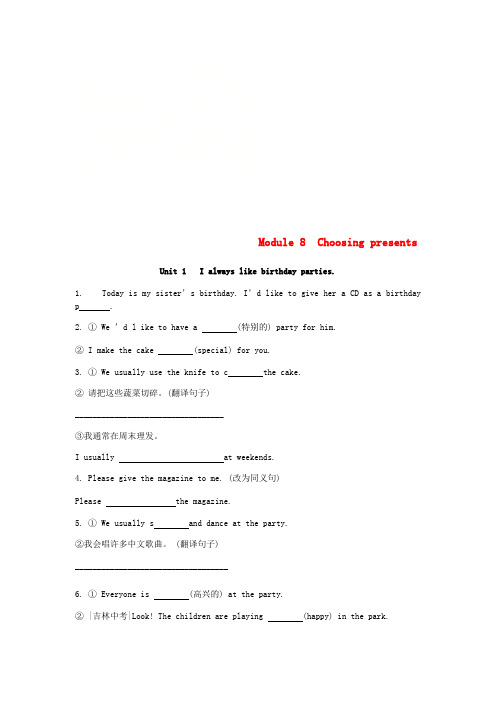
Module 8 Choosing presents Unit 1 I always like birthday parties.1. Today is my sister’s birthday. I’d like to give her a CD as a birthday p .2. ①We ’d l ike to have a (特别的) party for him.② I make the cake (special) for you.3. ① We usually use the knife to c the cake.②请把这些蔬菜切碎。
(翻译句子)__________________________________③我通常在周末理发。
I usually at weekends.4. Please give the magazine to me. (改为同义句)Please the magazine.5. ① We usually s and dance at the party.②我会唱许多中文歌曲。
(翻译句子)___________________________________6. ① Everyone is (高兴的) at the party.② |吉林中考|Look! The children are playing (happy) in the park.③ She looks (happy) today. What’s wrong with her?7. —How old is she?—I don’t know. Nobody knows her age. It’s her s .8. 我妈妈会做生日蛋糕。
My mother can .9. I think you can have great fun the party.A. onB. atC. forD. to10. ① |德州中考|—Would you like to come to dinner tomorrow evening? —.A. Yes, it’s trueB. You really doC. It’s upstairsD. Yes, I’d love to②—Would you like some more f ish?— I’m full.A. Yes, I’d like to.B. Yes, please.C. No, thank you.D. Sorry, I can’t.11. ①你想要些茶还是咖啡?Would you like some ?②“你喜欢听音乐还是看杂志?”我喜欢听音乐。
七年级英语上册 Module 8 Choosing presents Unit 3 Language

Module 8 Unit 3 Language in use【学习目标】1、本模块重点单词、句型;2、一般现在时实义动词的第三人称单数形式及其变化规则;3、频度副词的使用方法。
【课前朗读】朗读学生学过的单词、短语、句型、课文等。
【课堂活动】Step1、Have a dictation about key words.Step2、翻译下列短语1、愿意去做某事_____________________2、在这周六_____________________2、在我的生日聚会上_________________ 4、送生日卡片_________________5、用汉语_________________________6、一盒巧克力__________________7、做锻炼___________________________ 8、保持健康______________________9、花很多钱________________________ 10、去看电影______________________11.收到某人的信____________________ 12.喜欢去购物____________________Step3、模块知识回顾一、翻译句子(英汉互译)1、你愿意来参加我的生日聚会吗?是的,我愿意。
___________________________________ ____________________________________2.在中国的生日聚会上你通常做什么?_______________________________________3.我妈妈从来不做生日蛋糕。
_________________________________________4.What would you like for your birthday,Daming?__________________________________________5.那是个秘密。
外研版英语七年级上册 Module 8 Choosing presents
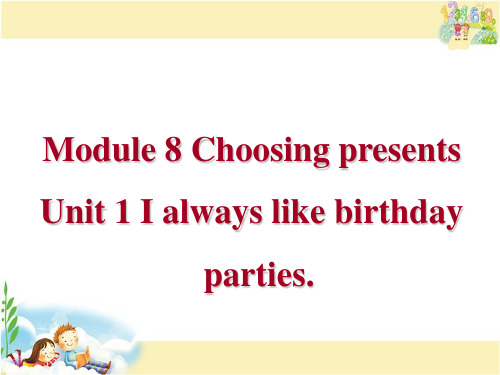
parties.
Words and expressions
[kɑ:d]
card
[‘pɑ:tɪ]
party
['prez(ə)nt] present
[wʊd]
would
[‘ɔ:lweɪz] always
பைடு நூலகம்
Our birthday is our mother’s suffering day / Good Friday.
我们的生日是母亲的受难日。
温馨提示 M-o-t-h-e-r
M is for the million things she gives me, M-Million给予我的无数
O means that she's growing old,
I never cry on my birthday.
+++
++
+
-
always usually often never
A: What do you nuoaefslvtuweeanarlylys do on your birthday?
B: I aolfwteanys I aolfwteanys I aolfwteanys I unseuvaerlly I unseuvaerlly
I get many _p_r_e_se_n_t_s_ (礼物) on my birthday every year.
These are birthday _c_a_r_d_s_ (卡片).
课后回顾
Words: birthday, card, party, present, special, cut, sing
外研版七年级英语上册英语《Module8,ChoosingpresentsUnit2》说课稿

外研版七年级英语上册英语《Module 8,Choosing presents Unit 2》说课稿一. 教材分析外研版七年级英语上册《Module 8, Choosing presents Unit 2》是一篇关于选择礼物的对话课文。
本课主要讲述了一个关于Tom和他的朋友们为Jane选生日礼物的场景。
通过这个场景,让学生学会如何根据人的喜好选择礼物,提高他们的英语语言运用能力。
二. 学情分析七年级的学生已经掌握了一定的英语基础知识,能够进行简单的英语交流。
但他们在实际运用英语进行对话时,还存在着一定的困难,特别是在语法和词汇方面。
因此,在教学过程中,需要注重激发学生的学习兴趣,提高他们的英语实践能力。
三. 说教学目标1.知识目标:让学生掌握表示喜好的句型如“I like…”, “I prefer…”; 学会如何根据人的喜好选择礼物。
2.能力目标:提高学生的英语听说读写能力,能用英语进行简单的日常交流。
3.情感目标:培养学生关爱他人,尊重他人喜好的品质。
四. 说教学重难点1.重点:掌握表示喜好的句型如“I like…”, “I prefer…”。
2.难点:如何根据人的喜好选择礼物,并用英语进行表达。
五. 说教学方法与手段1.采用任务型教学法,让学生在完成任务的过程中,学会如何根据人的喜好选择礼物。
2.运用多媒体教学手段,如图片、音频、视频等,激发学生的学习兴趣,提高他们的英语实践能力。
六. 说教学过程1.导入:通过展示不同类型的礼物图片,引导学生谈论自己喜欢的礼物,激发学生的学习兴趣。
2.新课展示:播放课文动画视频,让学生初步感知课文内容。
随后,引导学生跟读课文,模仿语音语调。
3.课堂讨论:让学生分组讨论,根据课文内容,列出他们认为Jane会喜欢的礼物。
4.实践环节:让学生分成角色,模拟Tom和他的朋友们的对话,练习如何根据人的喜好选择礼物。
5.巩固环节:设计一些选择礼物的练习题,让学生进行听力、口语和写作的训练。
七年级英语上册-Module-8-Choosing-presents-Unit-3-Language

目பைடு நூலகம் contents
写作训练
32/63
写作训练
学会写一篇关于庆贺生日文章。 【美文鉴赏学习】
It is almost Molly’s birthday, and she wants only one thing. She wants Dad to be home for her birthday. Molly’s father is a taxi driver. His taxi has a name. Its name is The King of the Road.
( B ) 2. —Can you come to my party? —_____. I have a lot of things to do.
A. I’m afraid so B. I’m afraid not
C. I’m sure
D. I’m fine
( B ) 3. My sister always spends lots of money _____ clothes.
22/63
巩固提升
12. 一张电影票_a_c_i_n_e_m_a__ticket 13. 一张音乐会门票_a_c_o_n__c_e_rt_ticket 14. 保持健康_s_ta_y__h_e_a_lt_hy 15. 锻炼_g_e_t_s_o_m__e_exercise 16. 喜欢做某事_li_k_e_d__o_in_g_ sth. 17. 去买东西_g_o__s_h_o_p_p_ing
21/63
巩固提升
6. 在生日会上a_t_a__b_ir_t_h_d_ay party 7. 做个生日蛋糕_m__a_k_e_a__b_irthday cake 8. 送生日卡_g_iv_e__b_i_rt_h_day cards 9. 用汉语_in__C_h_i_n_e_s_e 10. 收生日礼品_g_e_t_b_i_r_th_d_ay presents 11. 一盒巧克力a__b_o_x__o_f _c_hocolate
- 1、下载文档前请自行甄别文档内容的完整性,平台不提供额外的编辑、内容补充、找答案等附加服务。
- 2、"仅部分预览"的文档,不可在线预览部分如存在完整性等问题,可反馈申请退款(可完整预览的文档不适用该条件!)。
- 3、如文档侵犯您的权益,请联系客服反馈,我们会尽快为您处理(人工客服工作时间:9:00-18:30)。
《Module 8 Choosing presents Unit2 She often goes to concerts》教案一、学习目标:1.单词和短语:card, party, present, would, always, great, cake, never, special, eat, give, sing, happy, secret, CD, cinema, concert, magazine, scarf, silk, shirt, T-shirt, choose, exercise, wear, expensive, clothes, shoes, spend, money, film, song, match, weekend, at weekends, dear, hear, hear from, afraid2.交际用语:1)—Would you like to come to my birthday party?—Yes, I’d like to. When is it?2)Great!3)It’s a secret.3.重点句子:1) Daming always gets birthday presents!2) She often goes to the cinema.3) What do you usually do at a Chinese birthday party?4) We sometimes give birthday cards.5) My mother never makes a birthday cake.二、重点及难点:1.频度副词的使用及在句中的位置。
2.动词第三人称单数形式。
三、教学设计:Unit 2 She often goes to concerts.ⅠTeaching modelReading and writing.ⅡTeaching methodCommunicative approachⅢTeaching aims1. To get information from the reading material about choosing birthday presents.2. To write a description of one’s partner.3. To get to know compound nouns.ⅣTeaching ObjectivesKey vocabulary: CD, cinema, concert, magazine, scarf, silk, shirt, T-shirt, choose, exercise, wear, expensive, clothes, shoes, spend, money, film, song,match, weekend, at weekendsⅤTeaching aidsRecorder, OHP, videoⅥTeaching StepsStep 1 Warming-up1. Review the text of Unit 1.2. Show some pictures, ask the students to look at the pictures, then talk something about the pictures.3. Introduce the new words.4. Read the new words.Step 2 Practice1. Look at the pictures in Activity 1.2. Read through the list of presents and have the students repeat them after you chorally and individually.3. Match the words with the pictures.4. Check with a partner.5. Call back the answers from the whole class.Keys:1. a concert ticket2. a magazine3. a silk shirt4. a box of chocolate5. a T-shirt6. a CD7. a scarf8. a cinema ticket9. a footballStep 3 Reading.1. Play the recording.2. Ask the students to read through the passage.3. Match the people with what they like doing.4. Check with a partner.5. Call back the answers from the whole class.Keys: 1. c 2. b 3. d 4. a 5. e6. Choose presents from the pictures in Activities 1 for them.7. Check with a partner.8. Call back the answers from the whole class.Keys:1. T-shirt2. a silk dress, a scarf, and a box of chocolate3. a magazine and a cinema ticket4. a CD, a concert ticket5. football9. Complete the passage with the correct form of the words from the box.10. Check with a partner.11. Call back the answers from the whole class.Keys:1. spends2. money3. silk4. expensive5. concert6. weekends7. matches8. chooseStep 4 Writing and speaking.A. Write these sentences with ’ (apostrophe).1. Read through the sentences.2. Write these sentences with ’ (apostrophe).3. Check with a partner.4. Call back the answers from the whole class.B. Make a list of things you like and do.1. Ask the students to make their lists individually.2. You may care to suggest they write five things they like and five things they do.C. Work in pairs.1. Ask the students to talk about things they like and do .2. Write a description of their partner.Step 5 Important and difficult points.She has got 11 silk scarves, 20 shirts and a lot of shoes.在英语中,有些名词表示由两部分构成的东西。
这些名词常常只用复数形式。
做主语时谓语动词要用复数,表示数量时常与“数词+ pair(s) + of”搭配。
如:shoes鞋 trousers 裤子 glasses 眼镜gloves手套 shorts短裤 scissors剪刀chopsticks筷子That pair of trousers is Tony’s.那条裤子是托尼的。
Scissors are used to cut things.剪刀是用来剪东西的。
Step 6 Do exercises:A、单词拼写:1. I have two ______(双)of new shoes.2. The clothes are very nice. I don’t know which one to ______(选择).3. I have two______(票).One is for my mother, the other is for my sister.4. How much is this ____________(杂志)?5. How much do you _________(花费) on these presents?6. Please give me a _______(音乐会) ticket.7. He’ll buy two _____(盒子) of cookies for his son.8. This is a _______(丝绸) shirt.9. I don’t know those ________(歌手).10.My aunt sells ___________(衬衫).Answers:1. pairs2. choose3. tickets4. magazine5. spend6. concert7. boxes8. silk9. singers 10 . shirtsB、翻译下列句子:1.他喜欢阅读,但不喜欢去看电影。
__________________________________________________2.她从末去看足球赛。
__________________________________________________3.他既不喜欢打蓝球,也不喜欢踢足球。
__________________________________________________4.我妹妹经常去听音乐会,并且常买些她喜欢的歌手的唱片。
__________________________________________________Answers:1. He likes reading, but he doesn’t like to go to the cinema.2. She never goes to the football match.3. He doesn’t like playing basketball or playing football.4. My sister often goes to concerts and she usually buys CDs by her favourite singers.。
